Nigeria’s real estate market is standing at a crossroads in 2025. With an estimated 17–22 million housing deficit, the country faces one of the largest accommodation gaps in Africa. Every year, millions of Nigerians migrate from rural to urban centers, fueling rapid population growth in cities like Lagos, Abuja, and Port Harcourt. Yet, while the demand for homes, offices, and mixed-use spaces is skyrocketing, the supply remains far behind, creating both a challenge and a trillion-naira opportunity.
This paradox has transformed the property market into a dynamic battleground — where investors, developers, realtors, and homebuyers are trying to balance affordability with profitability, sustainability with speed, and innovation with regulation. What was once a traditional brick-and-mortar industry is now being reshaped by digital platforms, smart homes, diaspora-driven investments, and government-backed housing programs.
From affordable housing estates in secondary cities to luxury waterfront apartments in Ikoyi and Maitama, Nigeria’s property landscape is diversifying. Short-let apartments are attracting global travelers and Nigerians abroad, while PropTech innovations like 3D virtual tours, blockchain-powered land registries, and AI chatbots are changing how people buy and sell homes. Meanwhile, speculative land banking continues to thrive in hotspots like Ibeju-Lekki and Abuja’s Airport Road corridor, fueled by massive infrastructure projects.
But it’s not all smooth sailing. Risks like title fraud, multiple land sales, inflation, and regulatory bottlenecks still plague investors. For diaspora Nigerians, “how to invest without being scammed” remains the most searched real estate query. Yet, with challenges come opportunities — and those who understand the trends shaping the market are the ones positioned to win.
This guide dives deep into the 11 biggest real estate trends in Nigeria for 2025, offering not just an overview but also case studies, statistics, actionable guides, and diaspora-safe insights. Whether you’re an investor looking for ROI, a homebuyer seeking security, a developer eyeing new projects, or a Nigerian abroad trying to avoid omonile wahala, this article will serve as your roadmap.
By the end, you’ll know where the market is headed, which cities to watch, what pitfalls to avoid, and how to position yourself for success in Nigeria’s evolving property market.
1. Affordable Housing & Low-/Middle-Income Housing Solutions
Nigeria’s housing crisis remains the single biggest driver of real estate conversations. With a housing deficit estimated between 17–22 million units, millions of Nigerians—especially those in low- and middle-income brackets—struggle daily to secure decent and affordable accommodation. This shortfall is not just an economic issue; it is also a social emergency, affecting productivity, health, and even security.
The Demand Side: Who Needs Affordable Housing?
Over 70% of Nigeria’s urban population falls into the low- to middle-income category. Many live in overcrowded or substandard housing due to the high cost of rent in urban centers. For instance, in Lagos, a modest two-bedroom flat can cost upwards of ₦1.5 million annually, far beyond the reach of most workers earning ₦100,000–₦200,000 monthly. This affordability gap has created an urgent demand for alternative housing solutions.
Government Initiatives
The Nigerian government has recognized the problem, but progress has been slow. Still, a few programs have attempted to close the gap:
- National Housing Programme (NHP): Introduced by the Federal Government to build low-cost houses across different states.
- Family Homes Fund (FHF): A public-private initiative designed to finance affordable homes for low-income families, often with mortgage support.
- Rent-to-Own Schemes: Some state governments, notably Lagos, have experimented with models that allow tenants to transition into ownership by paying rent that contributes toward the purchase price.
While these efforts are commendable, bureaucratic bottlenecks, corruption, and underfunding limit their overall impact.
Private Sector Contributions
The private sector has stepped in to fill the void where the government falls short. Developers and cooperatives are experimenting with innovative solutions such as:
- Cooperative Housing Models: Groups pooling funds to build estates for their members.
- Micro-Mortgages: Loan products designed for low-income earners who can’t access traditional bank mortgages.
- Rent-to-Own by Developers: Firms like Adron Homes, PWAN, and Landwey are creating flexible payment plans to attract low-income buyers.
These innovations are slowly shifting housing from being a luxury for the few to an accessible dream for many.
Investor Opportunities
Affordable housing may not carry the glamour of luxury real estate, but it offers massive untapped ROI potential because:
- Demand is guaranteed—millions need it, and the deficit is widening.
- Scalability—low-cost estates can be replicated across states.
- Partnership models—investors can team up with governments, NGOs, and diaspora groups to fund projects.
For diaspora investors especially, affordable housing is a safer entry point—low-ticket investments reduce exposure to fraud while still offering stable returns.
Risks & Challenges
Affordable housing in Nigeria faces significant hurdles:
- High construction costs due to inflation and FX volatility.
- Land acquisition challenges, including title fraud and community disputes.
- Limited access to mortgage financing—less than 1% of Nigerians can access formal mortgages.
Still, for investors who take a long-term view, these risks can be mitigated by working with trusted developers and cooperatives.
Actionable Guide: Steps to Secure a Rent-to-Own Property
- Verify the developer’s track record (request CAC registration, past projects).
- Confirm land titles with the state land registry.
- Read the rent-to-own agreement carefully—understand interest rates and penalties.
- Visit the property before committing.
- Use a trusted lawyer to review documentation.
Diaspora Angle
For Nigerians abroad, affordable housing projects offer a way to invest back home without the complexities of luxury projects. Platforms now allow diaspora Nigerians to:
- Pool funds with cooperatives.
- Buy into fractional ownership schemes for affordable estates.
- Finance homes for family members with structured payments.
This ensures they get transparency, documentation, and verified partnerships, reducing the risk of scams.
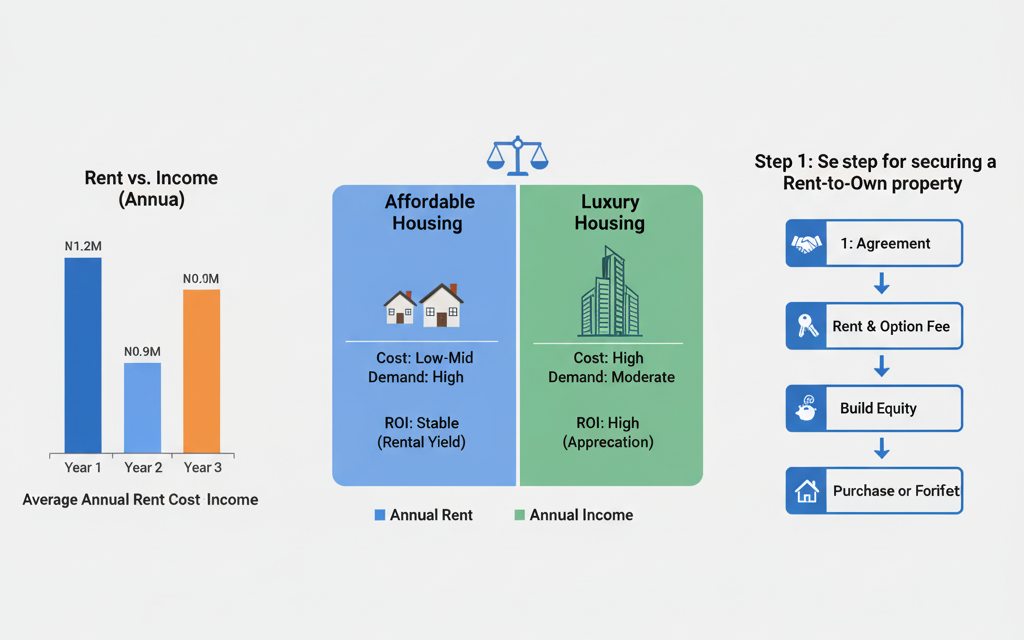
2. PropTech & Digitalization of Real Estate
In 2025, PropTech (Property Technology) is no longer a buzzword in Nigeria’s real estate market—it’s a transformative force. From online property marketplaces to blockchain-enabled land registries, technology is reshaping how Nigerians search, buy, sell, manage, and invest in property. In a country where real estate transactions have historically been plagued by opacity, fraud, and bureaucracy, digital tools are now offering the promise of transparency, convenience, and speed.
The Rise of Online Marketplaces
Platforms like PropertyPro.ng, PrivateProperty.com.ng, and Nigeria Property Centre have made it easier for buyers and renters to browse thousands of listings from their phones. These platforms have become a lifeline for diaspora Nigerians who want to view verified properties before committing funds.
Beyond simple listings, platforms now include:
- 3D Virtual Tours & Drone Videos – helping buyers visualize properties remotely.
- AI Chatbots – assisting with inquiries 24/7.
- Digital Documentation – reducing paperwork through e-contracts and online payments.
This trend is cutting out middlemen and empowering buyers to make more informed decisions.
Blockchain & Land Title Security
One of Nigeria’s deepest real estate problems is land fraud and title insecurity. Blockchain technology offers a potential solution by creating immutable digital land registries. With blockchain-based systems, every transaction is transparent and traceable, making it nearly impossible for land to be sold multiple times.
While blockchain adoption is still at an early stage, states like Lagos and Kaduna have shown interest in digitizing land records. If rolled out nationwide, this could revolutionize trust in Nigeria’s property market.
Case Studies & Local Examples
- RentSmallSmall: A PropTech startup tackling Nigeria’s rental crisis by allowing tenants to pay rent monthly instead of yearly upfront.
- Fibre.ng: Focuses on co-living solutions for young professionals in cities.
- Seso Global: A blockchain-powered platform helping diaspora Nigerians buy verified properties safely.
These examples highlight how PropTech is not only solving problems but also opening new investment models.
Investor Opportunities
PropTech creates opportunities for:
- Tech startups developing real estate apps and platforms.
- Traditional investors partnering with digital firms for property sales.
- Diaspora Nigerians looking for fraud-proof investment channels.
For real estate agents, embracing digital tools is no longer optional—it’s survival. Agents who rely only on traditional methods risk becoming obsolete.
Risks & Challenges
Despite its promise, PropTech adoption faces hurdles:
- Low internet penetration in rural areas limits reach.
- Digital fraud (fake online listings, cloned websites).
- Slow government adoption of digital title systems.
Investors must balance innovation with caution by verifying platforms before committing funds.
Actionable Guide: Apps Every Nigerian Property Buyer Should Know
- PropertyPro.ng – Property search & verified listings.
- Nigeria Property Centre – Comprehensive database of properties.
- RentSmallSmall – Flexible rental options.
- Seso Global – Blockchain-based secure property marketplace.
- Estate Intel – Data & analytics on Nigerian real estate.
Diaspora Angle
For Nigerians abroad, PropTech is the bridge that makes investing back home possible without being physically present. Virtual tours, e-signatures, and blockchain-backed transactions allow them to:
- Buy verified land or homes remotely.
- Track property development progress online.
- Avoid omonile fraud by dealing directly with verified platforms.
This is why diaspora-focused PropTech startups are on the rise, offering trust as their biggest selling point.
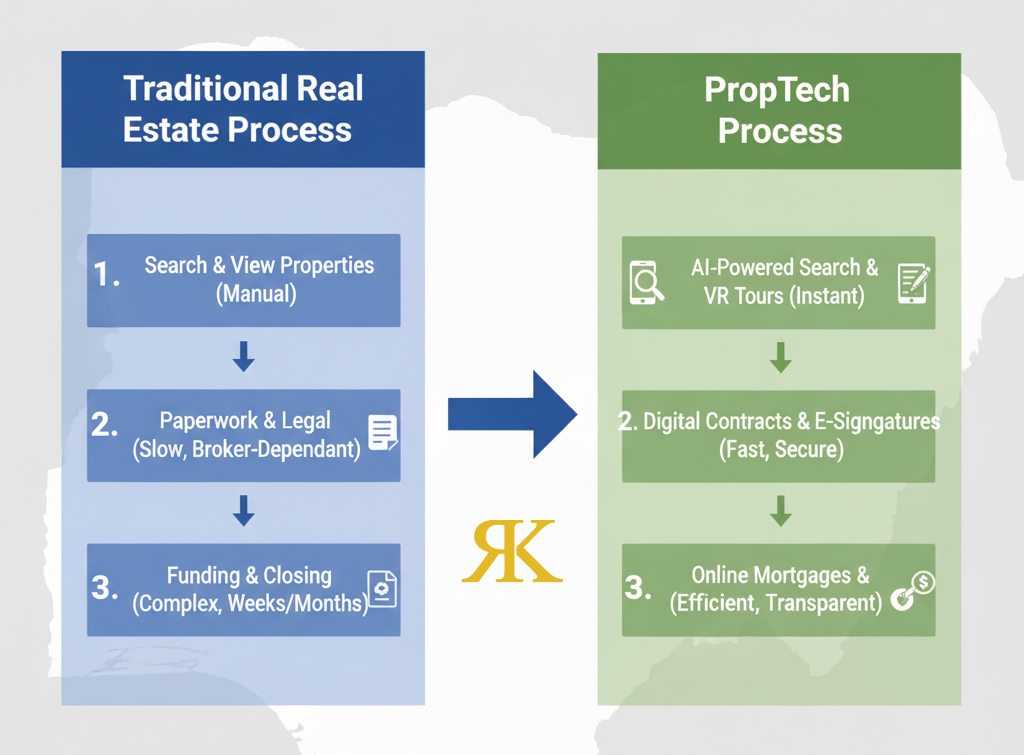
3. Mixed-Use Developments
Mixed-use developments — purposefully planned projects that combine residential, commercial, retail, and sometimes light-office or leisure spaces — have moved from niche concepts into mainstream real estate strategy in Nigeria. These developments create live-work-play environments that respond to urban lifestyles, reduce commute times, and bundle revenue streams (sales, rentals, retail leases, parking, service charges). For developers and investors, mixed-use projects offer the potential for diversified, stable cash flow and stronger long-term capital appreciation compared with single-use developments.
Why mixed-use works in Nigeria (appeal)
- Lifestyle demand: Young professionals and upwardly mobile families favor convenience. Access to shops, offices, gyms, and entertainment within walking distance is a strong selling point.
- Diaspora interest: Nigerians abroad increasingly prefer investments that provide both rental yield and lifestyle appeal for visiting relatives or personal stays.
- Risk diversification: By combining multiple revenue sources (residential rents + retail leases + parking/amenity fees), mixed-use projects spread market risk across sectors.
- Urban planning fit: Mixed-use aligns with contemporary urban planning goals — densifying cities while creating walkable neighbourhoods and reducing traffic pressure.
Case studies (relevant Nigerian examples)
- Eko Atlantic (Lagos) — a high-profile coastal development combining luxury residences, commercial towers, and retail precincts. It demonstrates how master-planned mixed-use projects can command premium pricing when infrastructure, security, and high-end amenities are delivered.
- Jabi Lake Mall area (Abuja) — the mall precinct and surrounding mixed developments illustrate suburban node creation: retail anchors create demand for nearby residential and office products, lifting land values and rental rates in the surrounding neighbourhood.
- Novare and similar developers — through regional malls and integrated precincts, these players show how a retail anchor plus residential/office components can create sustainable footfall and recurring income for investors.
These examples show a common formula: anchor retail or commercial elements attract continuous foot traffic, which supports residential demand and stabilizes cash flows.
Investor opportunities
- Buy-and-hold with blended yield: Investors can earn residential rental income while benefitting from retail lease escalations.
- Value-add repositioning: Acquire older properties near emerging nodes and convert or retrofit into mixed-use formats (adding retail pods, co-working floors, or serviced apartments).
- Pre-launch allocations: Purchasing early in a mixed-use masterplan often yields the best capital appreciation as infrastructure and anchor tenants come online.
- Partnerships with experienced operators: Co-invest with established developers or retail operators to reduce execution risk.
Risks & challenges
- High upfront capital: Mixed-use schemes require significant masterplanning, infrastructure, and phased delivery — increasing funding complexity.
- Execution risk: Failure to secure retail anchors or commercial tenants can cause cascading revenue shortfalls.
- Oversupply in some corridors: Poor market studies or speculative launches may create saturation in specific towns or suburbs.
- Management complexity: Mixed-use requires professional property management across retail, residential, and shared services — weak management erodes value.
- Regulatory and approvals: Coordinating multiple permits (zoning, environmental, fire safety) can delay delivery and increase costs.
Actionable guide — How to evaluate a mixed-use investment
- Anchor verification: Confirm committed anchor tenants (retail, office, or hospitality). Anchors make or break footfall.
- Masterplan quality: Assess circulation, parking, security, and amenity distribution — poor design reduces occupancy and yields.
- Developer track record: Check past mixed-use projects for delivery timelines, quality, and tenant retention.
- Phasing & financing: Understand how phases are funded; ensure later phases aren’t dependent on unrealistic early-phase returns.
- Exit options: Determine resale demand (owner-occupiers vs institutional buyers) and projected holding period.
- Management plan: Confirm who will manage retail leasing, residential services, and maintenance — insist on professional property managers.
- Legal & title checks: Verify land titles, planning approvals, and all encumbrances before subscribing to allocations.
Diaspora angle
Mixed-use developments are attractive to diaspora buyers seeking both lifestyle and yield. They offer secure, managed properties that can be rented professionally when the owner is abroad, and used during visits. For diaspora investors, priority actions are: buy into schemes with strong management, demand clear service level agreements, and prefer properties with confirmed retail anchors to reduce vacancy risk.
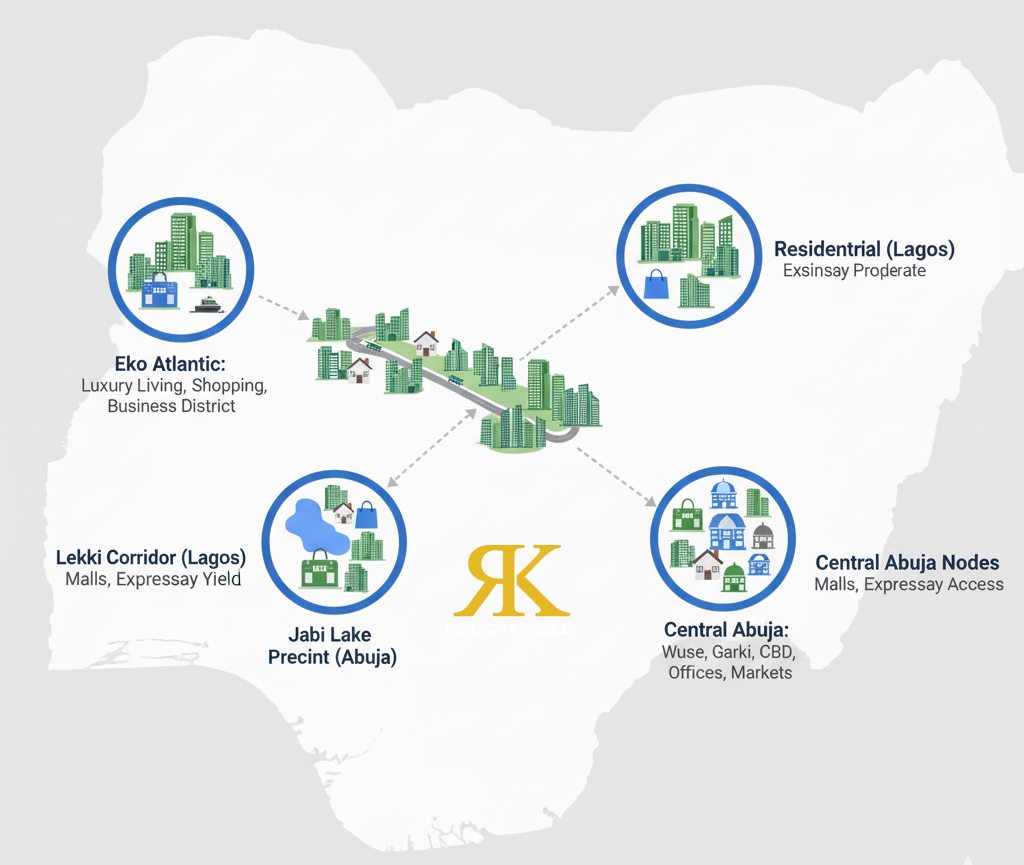
4. Urbanization & Growth of Secondary Cities
Nigeria’s rapid population growth and urban expansion have placed enormous strain on its two primary urban hubs, Lagos and Abuja. With Lagos projected to become the world’s most populated city by 2100, and Abuja struggling with rising costs and infrastructure pressure, investors and developers are shifting focus to secondary cities where opportunities are emerging for more affordable, sustainable, and profitable real estate plays.
The Problem in Lagos & Abuja
- Congestion and overcrowding – Lagos’ infrastructure lags behind its population growth, leading to constant traffic gridlock, rising commute times, and pressure on housing.
- Skyrocketing land and rental costs – Prime locations in Lagos (Ikoyi, Lekki, Banana Island) and Abuja (Maitama, Asokoro) are priced out of reach for most middle-income buyers and even many developers.
- Limited land availability – In both cities, new developments push further into suburbs, raising infrastructure costs and lengthening commutes.
- Rising service and living costs – Tenants and buyers face higher costs for utilities, transportation, and service charges, reducing affordability.
The Rise of Secondary Cities
To escape these limitations, both private investors and government initiatives are focusing on emerging urban centers with better affordability, planned infrastructure, and growth potential. Examples include:
- Ibadan (Oyo State): Nigeria’s largest city by landmass is experiencing renewed interest due to the Lagos-Ibadan Expressway upgrade and the new standard gauge railway, making commuting from Ibadan to Lagos more realistic. Real estate prices remain relatively low, offering investors land banking and residential development opportunities.
- Enugu: As the economic and political hub of the South-East, Enugu benefits from expanding infrastructure, diaspora interest, and relative political stability. Its hospitality and student housing markets are especially vibrant.
- Uyo (Akwa Ibom State): Government investment in roads, tourism, and hospitality is positioning Uyo as a rising real estate hotspot. Its appeal lies in affordability and growing demand for serviced apartments and gated communities.
- Akure (Ondo State): The city is attracting attention as a government administrative hub with expanding infrastructure, driven by Ondo’s economic policies and improving road networks.
- Port Harcourt (Rivers State) and Warri (Delta State): Though traditionally oil-dependent, diversification efforts are creating opportunities in residential estates and mixed-use projects targeting the middle-class population.
Infrastructure Driving Growth
- Transport projects: Lagos–Ibadan Expressway, Abuja–Kaduna–Kano railway, Second Niger Bridge, and regional airport upgrades are opening up secondary cities.
- University and industrial zones: Expansion of universities, free trade zones, and industrial corridors drive demand for student housing, staff quarters, and residential estates.
- Technology hubs: The emergence of innovation clusters in cities like Ibadan and Enugu is drawing young professionals who need modern housing solutions.
Investor Opportunities
- Land banking: Buy plots near key infrastructure projects (railway stations, new highways, industrial hubs) for long-term appreciation.
- Residential estates: Develop gated communities targeting middle-class professionals priced out of Lagos/Abuja.
- Hospitality and short-let apartments: Secondary cities with tourism or strong student/worker inflows (e.g., Uyo, Enugu) have growing demand for short-stay accommodation.
- Commercial properties: Rising populations in these cities mean increased demand for shopping malls, plazas, and office spaces.
Risks & Challenges
- Policy instability: State-level policies may shift with changes in government.
- Infrastructure delays: Not all announced projects are delivered on schedule, affecting projected ROI.
- Market depth: Some secondary cities may not yet have the income base to absorb luxury or high-cost developments.
- Security issues: Investors must evaluate safety and stability before large commitments.
Actionable Guide — How to Identify Promising Secondary Cities
- Follow infrastructure spend: Prioritize cities linked to federal/state road, rail, or airport upgrades.
- Track population growth: Demand follows migration; cities attracting professionals, students, or returnees grow faster.
- Check diaspora interest: Secondary cities with active diaspora communities often see stronger demand for gated estates and modern apartments.
- Study government masterplans: Look at urban development plans, housing projects, and zoning to anticipate growth corridors.
- Engage local agents: Work with trusted, established agents to avoid scams and understand micro-markets.
Diaspora Angle
For Nigerians abroad, secondary cities provide lower entry costs and higher potential growth rates than Lagos or Abuja. Buying land or off-plan units in well-located estates can yield 10x ROI within 5–10 years, especially where infrastructure projects are guaranteed. Diaspora investors should look for reputable developers with strong local credibility to avoid fraudulent schemes.
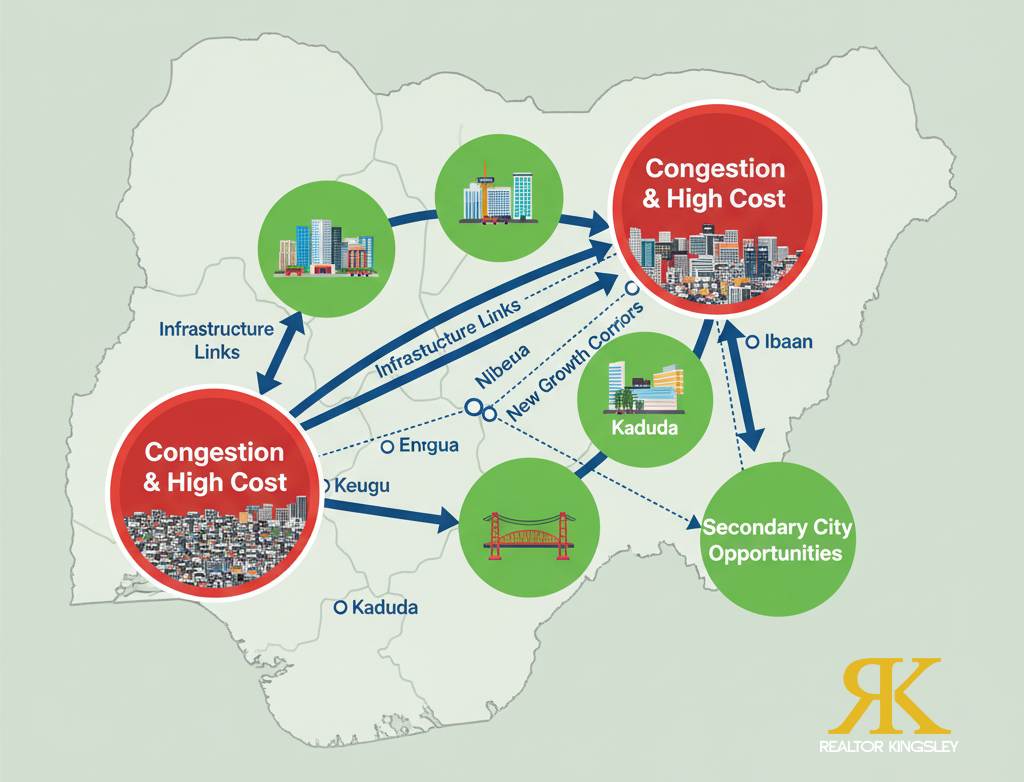
See also: Top 10 Real Estate Scams in Nigeria and How to Avoid Omonile Wahala
5. Short-Lets & Airbnb Market
The short-let and Airbnb market has become one of the fastest-growing segments in Nigeria’s real estate sector, reshaping how people perceive rental properties. Unlike traditional long-term leases, short-lets are furnished apartments or houses rented on a daily, weekly, or monthly basis, catering to both local and foreign guests who seek comfort, flexibility, and affordability compared to hotels.
Why Short-Lets are Gaining Popularity
- Lifestyle shift – Middle-class Nigerians, expatriates, and business travelers prefer the privacy, space, and convenience of furnished apartments.
- Cost advantage – Short-lets often provide more value than hotels, especially for groups or long stays, by offering kitchens, laundry, and living space.
- Tourism & business travel – Cities like Lagos, Abuja, Port Harcourt, and Uyo are hubs for corporate events, conferences, and leisure travel — driving demand for short-term accommodation.
- Diaspora visits – Nigerians abroad returning for holidays, weddings, or family events often prefer short-lets over hotels due to flexibility and home-like amenities.
ROI Comparison: Short-Let vs Long-Term Rentals
- Short-let apartments in prime locations like Lekki Phase 1, Victoria Island, or Maitama can generate 2–3 times more income annually compared to traditional yearly leases.
- For example, a two-bedroom apartment in Lekki renting at ₦3.5m/year long-term could fetch ₦80k–₦120k per night as a short-let, with strong occupancy rates delivering ₦15m–₦20m annually.
- However, ROI depends heavily on location, property furnishing, and management quality.
Regulatory & Management Challenges
While short-lets are profitable, investors face certain risks:
- Regulations & taxation – Some states may soon introduce taxes or restrictions on Airbnb-type rentals, especially in high-density urban areas.
- High maintenance costs – Short-lets require frequent cleaning, furnishing upgrades, and utilities (Wi-Fi, power backups), raising operating expenses.
- Security & tenant screening – Without proper vetting, short-let operators face risks of property damage, theft, or misuse.
- Occupancy fluctuations – Demand is seasonal (weddings, festive holidays, corporate events), so cash flow is not always steady.
Investor Opportunities
- Target prime locations: Short-lets thrive in areas close to airports, business districts, or tourist attractions.
- Furnished apartments: Offering tastefully furnished units with Wi-Fi, generators/inverters, and modern amenities increases occupancy rates.
- Serviced apartments: Partnering with professional managers to deliver hotel-style services (cleaning, concierge, security) helps retain clients.
- Digital marketing: Listing on Airbnb, Booking.com, and local platforms like ShortletNigeria increases visibility and bookings.
- Corporate partnerships: Collaborating with companies to house expatriates or staff during projects ensures stable occupancy.
Actionable Guide — How to Succeed in Short-Let Investment
- Do the math – Compare projected nightly/weekly income against annual long-term rental to see if returns justify higher costs.
- Furnish smartly – Invest in durable, stylish furniture and amenities that appeal to young professionals and business travelers.
- Hire professional managers – Outsourcing to short-let management companies can boost occupancy and reduce operational stress.
- Leverage reviews – Encourage satisfied guests to leave reviews online to boost credibility and visibility.
- Secure power solutions – With Nigeria’s power challenges, properties with 24/7 electricity (solar/inverter backup) command premium rates.
Diaspora Angle
For diaspora Nigerians, short-lets are an attractive dual-purpose investment:
- Units can serve as personal accommodation during visits.
- When abroad, they generate income as furnished rentals.
Diaspora investors should prioritize trusted local managers to handle bookings, cleaning, and tenant vetting.
Risks & Mitigation
- Risk of oversupply in popular areas like Lekki and Maitama — investors should differentiate through better service, security, and interior design.
- Regulatory risk — investors should stay informed about state laws on short-term rentals.
- High competition — only properties with excellent furnishing, reliable services, and strong online presence stand out.
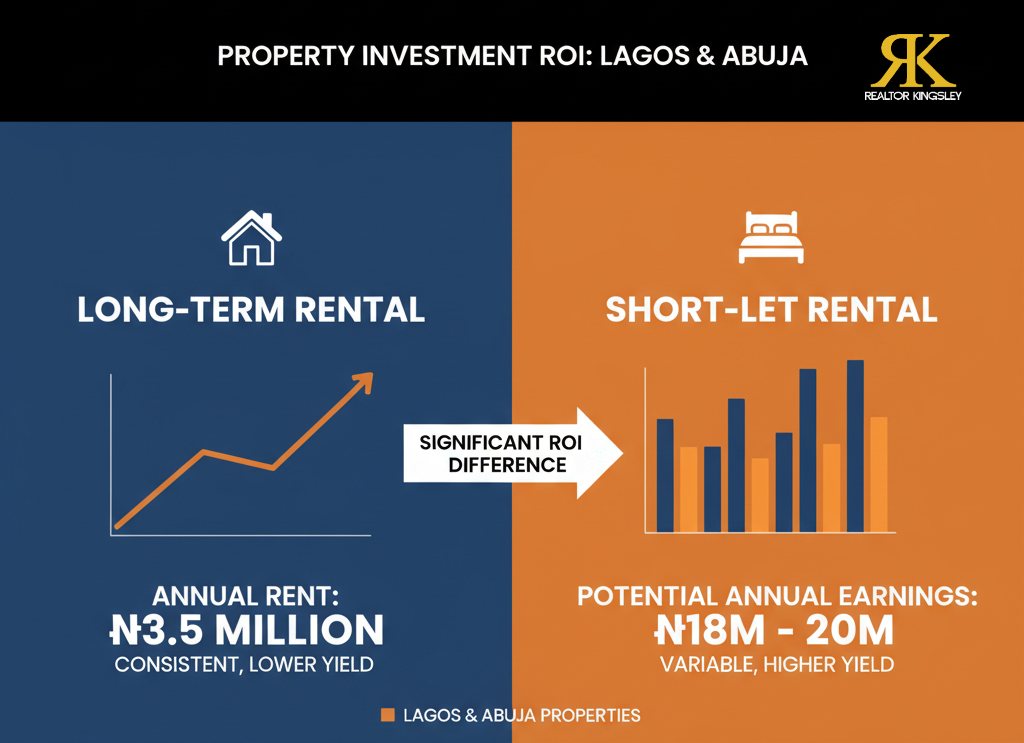
See also: How to Verify Land Documents in Nigeria (2025 Guide & Checklist)
6. Sustainability, Smart & Green Homes
As energy costs rise and eco-consciousness spreads, Nigeria’s real estate sector is slowly but steadily shifting towards sustainable, smart, and green housing solutions. These homes integrate renewable energy, energy-efficient designs, and technology-driven conveniences that not only reduce costs but also appeal to an emerging class of buyers — especially the diaspora and younger urban professionals.
Why the Push for Green & Smart Homes?
- Unstable power supply – With Nigeria’s national grid unable to meet demand, homes with solar panels, inverters, and hybrid systems are highly desirable.
- Rising cost of diesel & petrol – Developers and homeowners are seeking long-term alternatives to expensive, unsustainable generators.
- Health & comfort – Eco-friendly designs (natural ventilation, water recycling, low-energy lighting) improve quality of life.
- Diaspora demand – Nigerians abroad, exposed to global housing standards, often demand modern, sustainable features in their investments back home.
- Resale value – Properties with green certifications or smart systems can command a 10–20% premium in resale and rental markets.
Smart Home Features in Demand
- Security systems: Smart CCTV, motion sensors, and access control for gated estates and high-end apartments.
- IoT appliances: Remote-controlled lighting, air-conditioning, and entertainment systems.
- Energy efficiency: LED lighting, low-flow water systems, insulated roofing, and solar heaters.
- Automation: Integrated systems controlling lighting, temperature, and security from smartphones.
Sustainability Features Taking Hold
- Solar energy adoption – Developers are now integrating rooftop solar and central solar farms within estates.
- Water recycling & borehole systems – Some estates adopt greywater recycling and community boreholes to ensure water sustainability.
- Eco-friendly building materials – Bricks, bamboo composites, and local materials that reduce carbon footprint.
- Green architecture – Designs that maximize natural lighting, ventilation, and temperature regulation to cut electricity bills.
Case Studies in Nigeria
- Lagos: Several gated estates in Lekki and Ajah integrate solar-powered street lighting and inverter-ready wiring.
- Abuja: Luxury projects in Maitama and Guzape are marketing “smart-ready homes” with pre-installed automation and energy-saving systems.
- Diaspora-focused developers: Some developers explicitly target diaspora investors by branding estates as “eco-smart” and positioning them as safe, modern alternatives to traditional housing.
Investor Opportunities
- Premium rentals: Smart and green homes appeal to high-income tenants, expatriates, and diaspora families, commanding higher rents.
- Resale advantage: Early adopters benefit as eco-consciousness grows, making such homes stand out in a crowded market.
- Government incentives: While limited now, future tax breaks or subsidies for renewable energy adoption could increase ROI.
- Niche developments: Building eco-estates or smart mini-flats for tech professionals in cities like Lagos, Abuja, and Ibadan can capture strong demand.
Risks & Challenges
- High upfront cost – Solar panels, inverters, and IoT systems increase construction costs, which may deter buyers focused solely on affordability.
- Maintenance & technical know-how – Homeowners may struggle to maintain or repair advanced smart systems without reliable service providers.
- Market awareness gap – Many buyers still prioritize affordability over sustainability, limiting mass adoption in the short term.
- Supply chain issues – Import restrictions and currency volatility affect the cost of renewable energy equipment.
Actionable Guide — How to Evaluate a Green/Smart Home Investment
- Check developer credibility – Ensure the developer delivers on promised sustainability features.
- Evaluate energy savings – Calculate projected utility cost reductions vs traditional homes.
- Confirm after-sales support – Reliable maintenance and replacement services are critical for smart systems.
- Assess resale market – Consider the location’s buyer demographics; luxury hubs and diaspora hotspots yield better premiums.
- Prioritize hybrid solutions – Homes with both traditional power sources and renewable backup offer the safest returns.
Diaspora Angle
Diaspora Nigerians are key drivers of the smart and green home market. Many prefer to invest in secure, future-proof housing that matches global living standards. For them, smart eco-estates provide peace of mind, higher rental yields, and resale opportunities. Developers are increasingly packaging these as turnkey diaspora investment products.
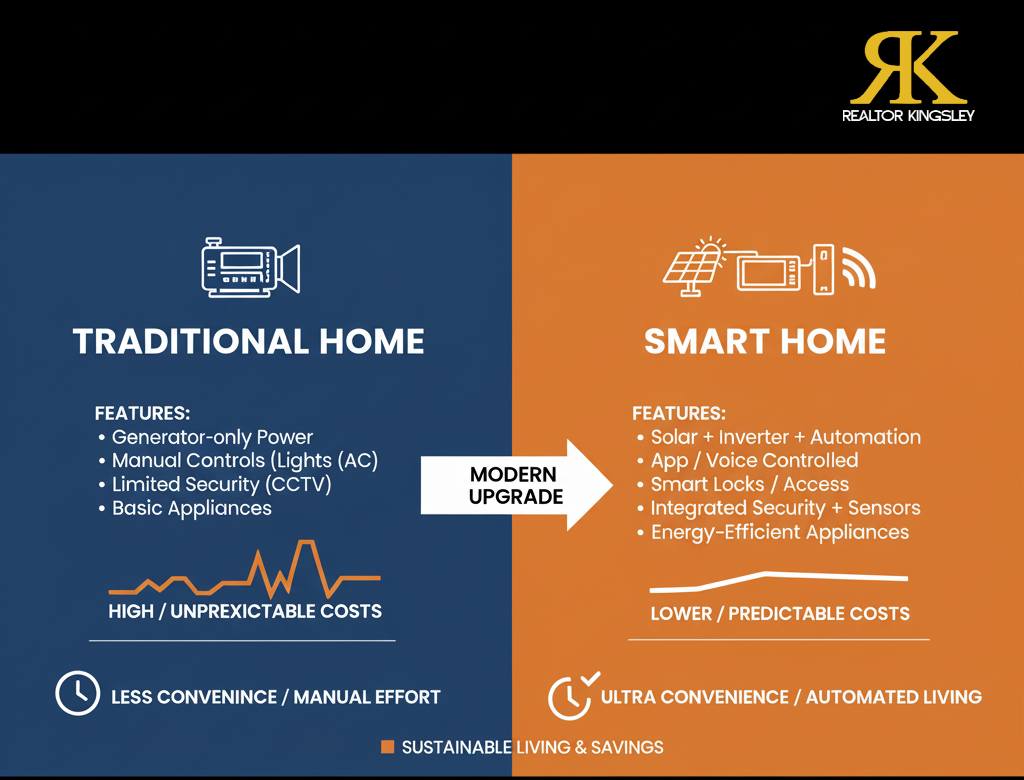
7. Land Banking & Speculative Investments
Land banking — the practice of buying undeveloped land in fast-growing areas and holding it for future resale — has become one of the most popular real estate strategies in Nigeria. With urban expansion pushing city boundaries outward and massive infrastructure projects unlocking new corridors, speculative land investments remain a proven path to wealth creation. However, the rewards come with unique risks, especially fraud and “Omonile” (land grabber) issues.
Why Land Banking is Popular in Nigeria
- Low entry barrier – Compared to building houses, buying land requires less capital, making it accessible to more investors.
- High appreciation potential – Areas connected to new infrastructure projects often see land prices rise 3x to 10x within 5–10 years.
- Cultural preference – Owning land remains a key symbol of wealth and security for many Nigerian families.
- Diaspora interest – Many Nigerians abroad see land banking as a safer entry point into the real estate market compared to managing construction projects.
Hot Zones for Land Banking
- Ibeju-Lekki (Lagos): With the Dangote Refinery, Lekki Deep Sea Port, and Free Trade Zone, land prices have appreciated massively, and more growth is expected.
- Abuja suburbs (Lugbe, Kuje, Wukara, Airport Road corridor): Expansion around Abuja’s city center makes these areas ripe for speculative buying.
- Ogun industrial zones: Areas like Mowe, Ibafo, and Sagamu are benefitting from industrial estates and proximity to Lagos.
- Port Harcourt and Asaba corridors: Linked to oil industry diversification and infrastructure projects.
Infrastructure Projects Fueling Growth
- Lekki-Epe Expressway expansion — driving exponential growth in the Lekki corridor.
- Abuja Airport Road upgrades — boosting demand in satellite towns.
- 2nd Niger Bridge — increasing property values in Anambra and Delta corridors.
- Lagos–Ibadan Expressway & Standard Gauge Rail — fueling Ibadan and Ogun State demand.
Investor Opportunities
- Early buy-ins: Acquire land at pre-infrastructure prices and exit once projects near completion.
- Estate development partnerships: Co-invest with developers who aggregate land, secure titles, and re-sell as serviced plots.
- Diaspora-safe investments: Reputable companies now offer verified plots with digital documentation to assure diaspora buyers.
- Commercial corridors: Buy near highways, airports, or industrial estates — future demand for warehouses, malls, and fuel stations will boost value.
Risks & Challenges
- Omonile issues – Local land grabbers often resell land to multiple buyers, leading to disputes.
- Fake titles – Forged C of O (Certificate of Occupancy) and survey plans remain rampant.
- Long holding period – Investors may wait years before realizing significant returns.
- Uncertain government policies – Expropriation or sudden policy changes can threaten land values.
- Infrastructure delays – ROI depends on actual delivery of promised roads, bridges, or industrial hubs.
Actionable Guide — How to Avoid Land Banking Pitfalls
- Verify land titles – Use accredited surveyors and lawyers to confirm authenticity of documents.
- Buy from reputable developers – Prefer estates with government approval and proper layout plans.
- Check zoning & masterplans – Ensure land aligns with future use (residential, commercial, industrial).
- Register purchase – File documents with state land registry to secure legal ownership.
- Plan long-term – Land banking is not a “quick flip” strategy; it requires patience for infrastructure and demand to catch up.
Diaspora Angle
Land banking is one of the most attractive strategies for diaspora Nigerians who want long-term capital appreciation without the stress of building or managing tenants. Safe entry options include:
- Buying verified plots in gated estates managed by trusted developers.
- Choosing land close to ongoing infrastructure projects for guaranteed appreciation.
- Insisting on digital documentation and legal registration to avoid fraud.
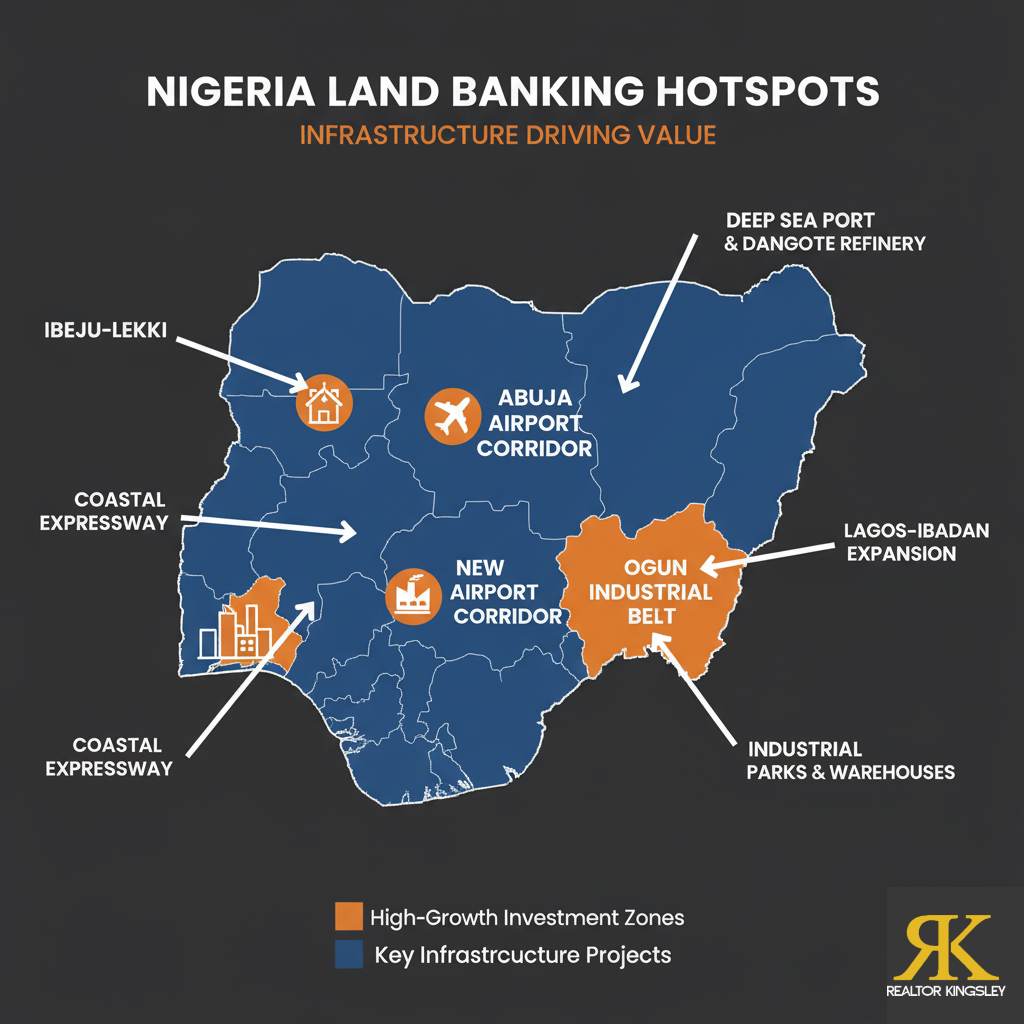
Section 8: Real Estate Investment Trusts (REITs) & Fractional Ownership
In recent years, one of the biggest barriers to real estate investment in Nigeria has been capital intensity. For decades, property acquisition was viewed as a game only for the wealthy—individuals and corporations with the liquidity to buy land, build, or purchase entire blocks of flats. But the global financial landscape is changing, and Nigeria is catching up with trends like Real Estate Investment Trusts (REITs) and fractional ownership. These models are breaking the monopoly of high-net-worth individuals, giving everyday Nigerians—including diaspora investors—the chance to access profitable property markets without needing hundreds of millions upfront.
What are REITs?
A Real Estate Investment Trust (REIT) is essentially a company that owns, operates, or finances income-producing properties. Instead of buying a building outright, investors purchase shares in the REIT, similar to buying stocks. In return, they receive dividends from the rental income or capital appreciation of the properties under management.
In Nigeria, REITs are regulated by the Securities and Exchange Commission (SEC). The Investment and Securities Act (ISA) and SEC rules stipulate that at least 75% of a REIT’s income must come from real estate, and 90% of taxable profits must be distributed to shareholders as dividends.
Currently, Nigeria has only a handful of listed REITs, such as:
- Union Homes REIT
- UPDC REIT (operated by UPDC Plc)
- Skye Shelter Fund
Combined, they control less than ₦100 billion in assets (tiny compared to Nigeria’s $400 billion housing deficit market). However, with growing financial literacy, they are attracting more attention.
What is Fractional Ownership?
Fractional ownership is different but related. Here, a property is digitally or legally “split” into shares or units. Multiple investors co-own the property, each contributing a percentage of the total purchase cost. Returns are then distributed based on ownership share.
For example, a commercial property in Abuja worth ₦500 million could be divided into 5,000 ownership units of ₦100,000 each. Instead of one buyer, 5,000 people can now own a piece of it—and earn rent proportionally.
Several Nigerian proptech startups, such as Risevest, Coreum, and Spleet, are experimenting with models of fractional property investment, often integrating fintech and blockchain to build trust and transparency.
Why These Models Matter for Nigeria
- Lower Entry Barriers – With inflation and the naira’s declining value, saving ₦50 million for land in Abuja is nearly impossible for average Nigerians. But investing ₦100,000 in a fractional scheme or buying REIT shares makes participation feasible.
- Diaspora Participation – Nigerians abroad often face fraud when trying to invest at home (“omo-onile wahala”). REITs and fractional platforms—especially those tied to stock markets or fintech apps—give diaspora investors secure, regulated, trackable options.
- Liquidity – Unlike physical real estate, which can take months or years to resell, REIT shares are traded on stock exchanges. Fractional platforms also offer secondary markets where investors can sell their units quickly.
- Diversification – Instead of putting all your money into one risky land plot, REITs spread investments across multiple properties (residential, malls, offices, hotels), reducing exposure.
Risks & Limitations
- Limited Options in Nigeria – With only a few REITs in operation, choice is small compared to countries like the U.S. (with 200+ REITs).
- Low Public Awareness – Many Nigerians still don’t understand REITs, and fractional ownership is sometimes mistaken for Ponzi schemes.
- Liquidity Risk – While in theory REIT shares are liquid, Nigeria’s low trading volume means you might not find buyers easily.
- Regulatory Gaps – Fractional models, especially those involving blockchain, are still under unclear SEC regulation, leaving room for investor risk.
Mini Guide: How to Invest in REITs & Fractional Ownership in Nigeria
- For REITs
- Open a CSCS (Central Securities Clearing System) account via a stockbroker.
- Research listed REITs on the Nigerian Exchange (NGX).
- Buy REIT units just like you would buy stocks.
- Track dividend payments—most Nigerian REITs pay quarterly or annually.
- For Fractional Ownership
- Choose a credible platform (check SEC registration, reviews, and transparency of deals).
- Study the property details: location, expected rental yield, appreciation potential.
- Start small—many platforms allow entry from as low as ₦50,000.
- Monitor performance via the platform’s dashboard or secondary markets.
Nigerian Case Study: UPDC REIT
UPDC REIT is Nigeria’s largest, with assets spanning residential, commercial, and hospitality. In 2023, it paid out dividends yielding around 5–6%. While this is modest compared to land flipping, it offers safer, consistent returns. Investors who bought into the REIT avoided the risks of direct property management (tenants, omo-onile, land titles).
Global Comparisons
- In the U.S., REITs manage assets worth over $3 trillion.
- In Kenya, fractional ownership apps have enabled over 50,000 investors to co-own rental apartments.
- Nigeria is still far behind, but the appetite is growing as inflation pushes people toward asset-backed investments.
The Future of REITs & Fractional Ownership in Nigeria
The coming years will likely see:
- More fintech–real estate partnerships (banks + proptech).
- SEC regulation of digital fractional models, boosting trust.
- Diaspora-focused REITs, targeting remittances (over $20 billion annually).
- Integration with blockchain, making ownership shares tamper-proof.
For Nigerian investors at home and abroad, these models represent the democratization of real estate—a shift from the days when only elites could afford property.
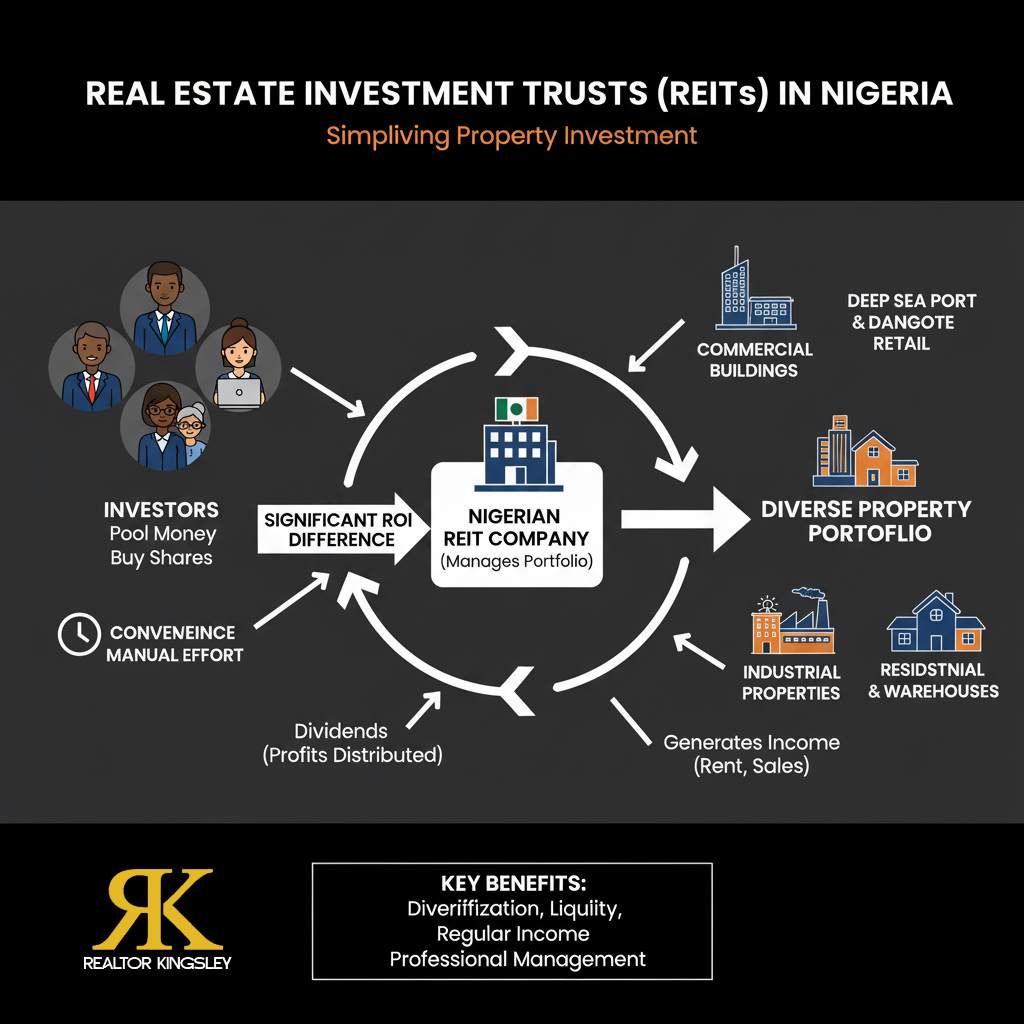
Section 9: Luxury Real Estate Trends
Luxury real estate in Nigeria has always carried an air of exclusivity, status, and prestige. Unlike affordable or mid-income housing, the luxury market is not driven by mass demand but by scarcity, prime locations, and lifestyle features that appeal to the wealthy few. In cities like Lagos and Abuja, luxury homes symbolize wealth, power, and global sophistication. Over the past decade, the segment has seen significant transformation, shaped by international tastes, technology, and shifting investor dynamics.
Demand: The Hotspots of Luxury Living
The Nigerian luxury property market is concentrated in a few high-value neighborhoods:
- Ikoyi, Lagos – Known as Nigeria’s “old money” hub, Ikoyi is home to some of the most expensive apartments and mansions in West Africa. Prime waterfront properties on Bourdillon Road and Osborne Foreshore are particularly sought after.
- Banana Island, Lagos – Often called “Africa’s Billionaires’ Playground,” Banana Island offers gated exclusivity, world-class infrastructure, and some of the continent’s most expensive price tags. Properties range from $1 million villas to $5 million penthouses.
- Maitama, Abuja – Housing Nigeria’s political elite, Maitama combines serenity with proximity to government institutions. Luxury here leans toward sprawling mansions and embassies.
- Asokoro, Abuja – Another power district, Asokoro attracts high-ranking government officials, diplomats, and expatriates.
Demand in these neighborhoods is fueled not only by Nigerians but also by expatriates and diaspora buyers who seek high-end homes for both investment and prestige.
Features Defining Luxury Real Estate in Nigeria
What makes a property “luxury” is no longer just size; it is experience-driven design and exclusivity. The following features dominate Nigeria’s luxury developments:
- Waterfront Properties – Waterfront apartments in Ikoyi and Banana Island command a premium, offering panoramic lagoon views and private marinas.
- Smart Home Automation – High-net-worth individuals (HNIs) expect homes integrated with technology: biometric entry, remote-controlled lighting, climate systems, and AI-powered security.
- Private Security & Gated Communities – Insecurity in Nigeria has made top-grade security indispensable. Bulletproof doors, CCTV, 24/7 guards, and access-controlled estates are standard.
- Leisure Amenities – Infinity pools, rooftop lounges, gyms, spas, and private cinemas are increasingly standard features.
- Sustainability & Green Living – Solar energy, water recycling systems, and eco-friendly designs are gaining traction among eco-conscious elites.
Who Are the Buyers?
The typical buyers in this market fall into three categories:
- High-Net-Worth Individuals (HNIs) – Business magnates, oil and gas executives, tech entrepreneurs, and politicians. For them, luxury property doubles as a lifestyle statement and an inflation hedge.
- Expatriates – Multinational companies often house senior executives in high-end properties in Ikoyi, Banana Island, Maitama, and Asokoro, sometimes renting at $80,000–$150,000 per year.
- Diaspora Nigerians – Many Nigerians abroad see luxury real estate as a secure way to reinvest back home. For diaspora investors, high-end projects are attractive due to brand reputation (e.g., Sujimoto) and premium appreciation potential.
Risks in the Luxury Real Estate Market
Despite its appeal, luxury real estate carries inherent risks:
- Foreign Exchange (FX) Fluctuations – Many luxury properties are priced in U.S. dollars. With the naira’s volatility, both buyers and developers face uncertainty. A mansion listed at $2 million in 2022 could cost significantly more in naira terms in 2025.
- Limited Buyers’ Pool – Unlike affordable housing, the luxury market caters to a small niche. Selling or reselling properties can take time due to limited demand.
- Oversupply Risk – In certain cycles, developers flood the market with luxury projects, creating competition and reducing rental yields.
- Economic Downturns – Luxury housing is vulnerable to political instability, oil price shocks, and global economic slowdowns that affect HNIs’ liquidity.
Case Study: Sujimoto Developments
Sujimoto Construction Limited, led by Sijibomi Ogundele, has become synonymous with luxury real estate in Nigeria. The company has transformed the Lagos skyline with developments like Lucrezia by Sujimoto (Banana Island) and Leonardo by Sujimoto (Banana Island waterfront tower).
- Lucrezia offers private elevators, an IMAX cinema, an infinity pool, and world-class automation systems—features that rival luxury apartments in Dubai and New York.
- Leonardo markets itself as a “skyline-defining” project, combining waterfront luxury with cutting-edge smart home features.
Sujimoto’s model demonstrates that Nigeria’s luxury market is no longer about “local big houses” but about global-standard developments that appeal to diaspora Nigerians and international investors.
Outlook
While the pool of buyers is limited, Nigeria’s luxury property market will continue to thrive as long as status, security, and exclusivity remain key drivers for the wealthy. In a country with over 9,000 dollar millionaires (according to Knight Frank Wealth Report 2024), demand in prime districts will remain resilient, especially from those seeking trophy assets and diaspora investors looking for prestige-backed investments.
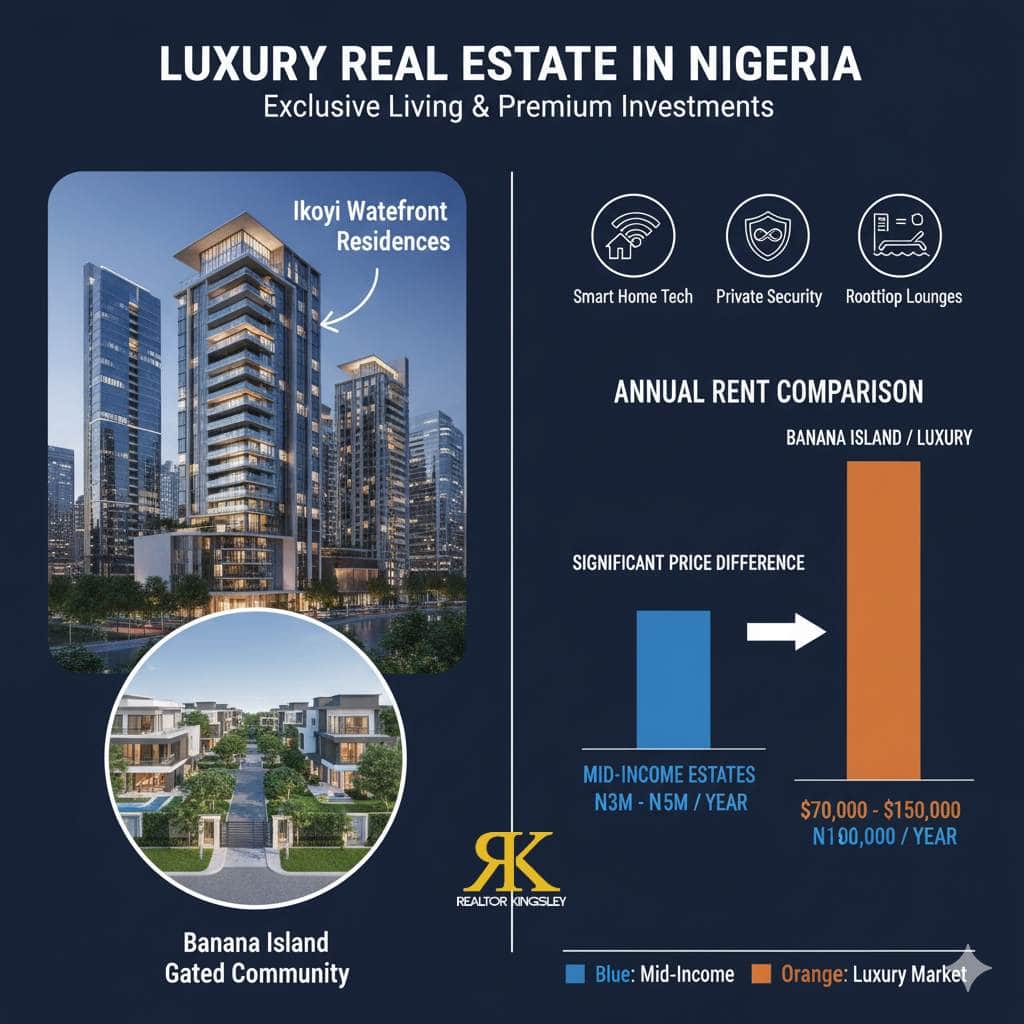
Section 10: Infrastructure & Property Value
One of the most powerful forces shaping property values in Nigeria is infrastructure development. Roads, bridges, airports, and railways don’t just improve mobility; they directly transform the fortunes of entire communities. A plot of land that was once “too far” or “landlocked” can suddenly multiply in value when new infrastructure makes it accessible. For smart investors, this presents a golden rule: “Buy near tomorrow’s infrastructure today.”
How Infrastructure Shapes Real Estate Value
- Accessibility – Good roads reduce travel time, making formerly remote areas viable for commuters and businesses.
- Commercial Attraction – Infrastructure attracts banks, malls, schools, and hospitals, which in turn boost property desirability.
- Price Appreciation – Land near new infrastructure often appreciates by 100–300% within a few years.
- Diaspora & Expat Appeal – Nigerians abroad and expatriates prefer properties with proximity to airports, expressways, and stable utilities.
When governments and private developers invest billions into infrastructure, the ripple effect almost always lands in the pockets of early property buyers.
Case Studies: Real Proof on the Ground
1. Lagos–Ibadan Expressway
- Once notorious for traffic jams and bad roads, the Lagos–Ibadan Expressway is now being reconstructed into an international-standard dual carriageway.
- Land along Mowe, Ibafo, and Ogunmakin that sold for as little as ₦200,000–₦500,000 per plot in the early 2000s now goes for ₦10m–₦25m per plot in 2025.
- Developers have responded with gated estates, industrial hubs, and hospitality projects along the corridor.
2. 2nd Niger Bridge
- Commissioned to ease traffic between Onitsha (Anambra) and Asaba (Delta), this bridge is already transforming southeastern property dynamics.
- Before the bridge, Onitsha’s growth was constrained by bottlenecks on the old bridge. Since completion, land in Asaba’s Okpanam and Ibusa areas has jumped by 150% in just three years.
- Investors who bought plots for ₦1.5m in 2020 are reselling today for ₦3.5m–₦4m.
3. Abuja Airport Road Corridor
- Abuja’s Airport Road has become a hotbed of real estate activity thanks to dualization, landscaping, and connectivity to both the city center and the airport.
- Districts like Lugbe, Kyami, and Wukara have witnessed exponential growth. For example, plots that sold for ₦2m–₦3m in 2015 now command ₦15m–₦30m in 2025.
- Ongoing projects such as the Centenary City and World Trade Centre Abuja are expected to push values even higher.
These case studies highlight one truth: infrastructure is the fuel that drives real estate appreciation.
Investor Opportunity: Timing is Everything
The smartest investors don’t wait until the ribbon-cutting ceremony. They act before completion:
- Pre-Infrastructure Stage: Prices are cheapest here. Risk is higher, but so are potential rewards. Example: buying near the Lagos–Epe corridor before Dangote Refinery broke ground.
- Construction Stage: As work begins, awareness spreads, and prices climb steadily.
- Completion Stage: By the time the road, bridge, or airport is open, land prices often double or triple, and entry costs outpace most average buyers.
Tip for Diaspora Investors – Instead of buying “finished luxury,” consider acquiring land around developing corridors with trusted developers. You can hold for resale or build later when values peak.
Risks to Watch Out For
While infrastructure-driven investments are lucrative, they’re not without risks:
- Delays in Completion – Projects can stall due to funding or politics, locking investors in longer than expected.
- Speculative Bubbles – Overhype can lead to artificial price jumps that may not be sustainable.
- Omonile (Land Grabber) Issues – Early-stage land often comes with title risks. Always verify documentation through the state land registry or FCDA.
Smart investors mitigate these risks by working with credible developers, verifying land titles, and diversifying their portfolios across different corridors.
Outlook
Nigeria’s infrastructure push is far from over. With the Lagos 4th Mainland Bridge, Abuja Light Rail expansion, and multiple industrial corridors underway, the next decade will unlock billions in real estate value. The winners will be those who spot these opportunities early, acquire land strategically, and ride the wave of appreciation as infrastructure transforms “bush” into booming communities.
For investors, the lesson is clear: follow the bulldozers. Where roads and bridges go, real estate wealth follows.

Section 11: Regulatory Reforms & Land Title Security
One of the biggest barriers to real estate growth in Nigeria is land title insecurity. For decades, property buyers have struggled with fake documents, duplicate sales, and government bureaucracy. These issues not only discourage local buyers but also make diaspora Nigerians and foreign investors hesitant to commit capital. Strengthening regulatory reforms and improving land title security is therefore essential for unlocking the full potential of Nigeria’s property market.
Challenges in Land Title Security
- Fake Certificates of Occupancy (C of O)
Fraudsters often forge or duplicate Certificates of Occupancy, selling the same land to multiple unsuspecting buyers. Without careful verification, investors can lose millions. - Multiple Sales of the Same Plot
The notorious “omonile wahala” (land grabber issue) remains rampant in Lagos, Ogun, Abuja suburbs, and other fast-growing areas. Families or communities sometimes sell the same land repeatedly, leading to legal battles. - Cumbersome Bureaucracy
Obtaining genuine land titles is often slow, expensive, and opaque. Lengthy approval times discourage buyers, while corruption in land registries creates uncertainty. - Judicial Bottlenecks
Property disputes can take years to resolve in Nigerian courts, leaving buyers financially trapped.
Government Efforts at Reform
Recognizing these challenges, federal and state governments are pushing reforms:
- Digitization of Land Registries – Lagos, Kaduna, and Abuja have begun migrating land records online, making it easier to search and verify ownership.
- E-Certificates of Occupancy – Some states are piloting digital C of Os with QR codes and blockchain-backed verification to reduce forgery.
- Public Awareness Campaigns – Real estate agencies, state land bureaus, and professional bodies like the Nigerian Institution of Estate Surveyors and Valuers (NIESV) are educating buyers on due diligence.
- Policy Reforms – There are ongoing conversations about reforming the Land Use Act of 1978, which gives governors sweeping powers over land allocation, often abused for political or financial gain.
While progress is slow, these reforms represent a step toward greater transparency and investor confidence.
Actionable Guide: 5 Steps to Verify Property Titles in Nigeria
Before buying land or property, every investor should follow these steps:
- Search the Title at the Land Registry
Visit the state or Federal Capital Territory (FCT) land registry to confirm the authenticity of the C of O, Governor’s Consent, or Deed of Assignment. - Check Survey Plan at the Surveyor General’s Office
Ensure the survey plan matches the land location and is not overlapping government-acquired land. - Conduct a Physical Site Inspection
Visit the property with a professional surveyor or estate agent to confirm boundaries and community acceptance. - Engage a Property Lawyer
Never skip legal review. A property lawyer can detect irregularities in documents and draft agreements to protect your interest. - Verify with Local Authorities & Community Leaders
Especially in rural or peri-urban areas, confirm with the community that the seller has the right to sell.
Risks That Remain
Even with reforms, challenges persist:
- Slow Adoption – Not all states have digitized their registries, making title verification inconsistent across Nigeria.
- Corruption & Political Interference – Some officials exploit the system for personal gain, delaying or withholding approvals.
- Incomplete Records – Many older land transactions are undocumented or missing from registries, creating loopholes for fraud.
Investors must remain vigilant until reforms fully take root.
Diaspora Investor Angle
For Nigerians abroad, title insecurity is the number one fear when investing back home. To mitigate risks:
- Work with Trusted Developers – Diaspora buyers should prioritize developers with proven track records (e.g., estates delivered with verifiable titles).
- Use REITs and Fractional Platforms – Real Estate Investment Trusts and regulated digital platforms offer safer exposure without direct title risks.
- Hire Independent Lawyers – Relying solely on developer-provided documents can be risky. An independent legal review from a trusted firm in Nigeria is essential.
By combining digital reforms with trusted intermediaries, diaspora investors can confidently enter Nigeria’s real estate market without falling victim to scams.
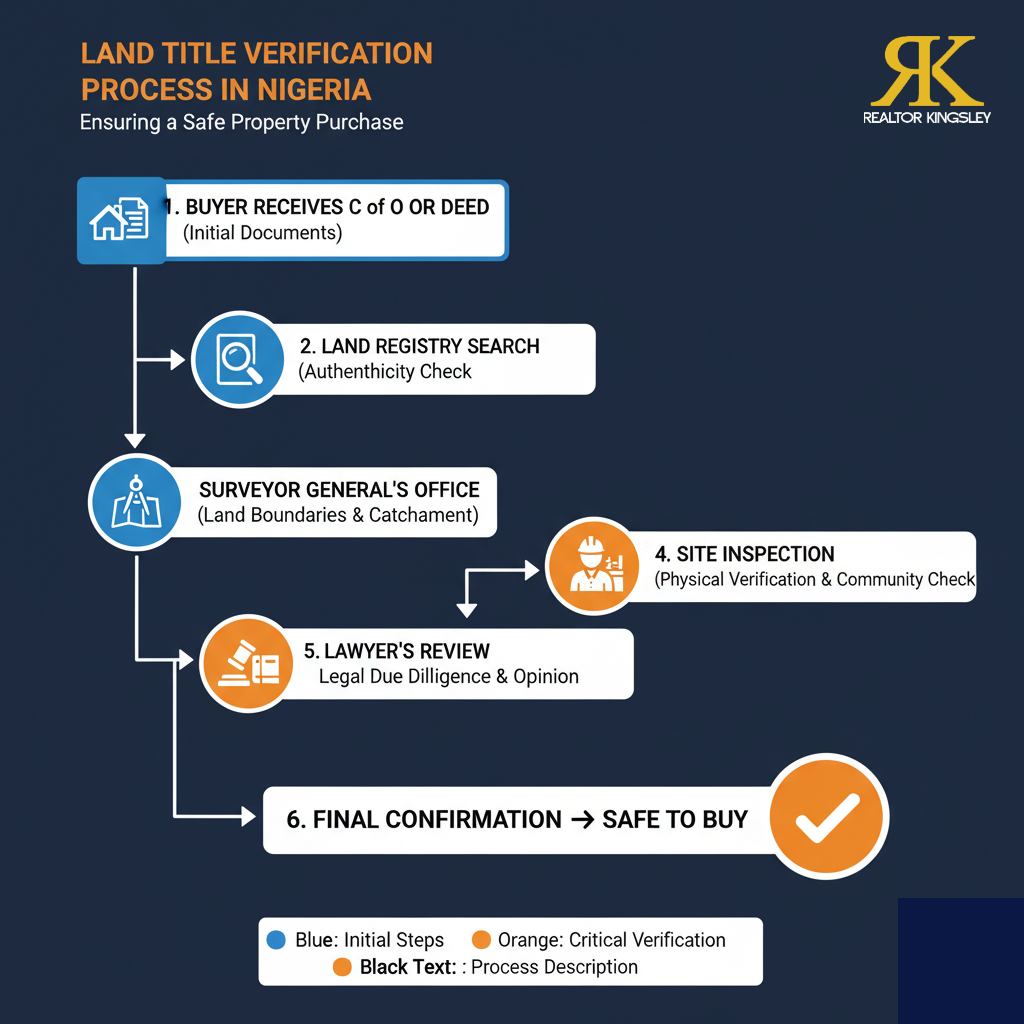
This visual simplifies a complex process and educates readers at a glance.
Outlook
Land title reform will be a game-changer for Nigerian real estate. As digitization expands and blockchain solutions are integrated, fraud will decline, transparency will rise, and diaspora investors will return with confidence. However, for now, buyers must combine due diligence with government reforms to protect their investments.
Future Outlook (2025–2030)
Nigeria’s real estate market is positioned for accelerated transformation in the next five years, shaped by technology, government policy, and investor-driven urban expansion. The convergence of smart infrastructure, sustainable housing, and digital platforms will define property demand and value appreciation across the nation.
Predictions & Trends
- Smart Cities & Tech Integration
- Urban centers like Abuja, Lagos, and Port Harcourt are moving toward smart city frameworks, integrating IoT-enabled utilities, green buildings, and e-governance.
- AI-driven property valuation tools will make pricing more transparent, reducing fraud and boosting investor confidence.
- Public-Private Housing Partnerships (PPP)
- The government is expected to scale up PPP housing schemes to close Nigeria’s 20+ million housing deficit.
- Developers who align with these schemes stand to gain from bulk housing contracts and steady demand from the middle class.
- PropTech Expansion
- Platforms that merge blockchain-backed land registries with mobile transactions will likely dominate property verification and sales.
- Virtual reality (VR) tours and digital escrow services will make cross-border real estate deals easier for the diaspora.
Hot Growth Zones
- Coastal States (Lagos, Akwa Ibom, Rivers)
- Driven by blue economy investments, seaports, and oil & gas diversification.
- Industrial Hubs (Ogun, Kaduna, Anambra)
- Factories and trade corridors will fuel residential and commercial property demand.
- Expressway Corridors (Lagos-Ibadan, Abuja-Keffi, East-West Road)
- New roads and upgraded highways will unlock satellite towns, turning once-overlooked communities into property goldmines.
Risks & Cautions
- Macroeconomic Pressures – Persistent inflation, high interest rates, and currency instability could reduce affordability and slow mortgage uptake.
- Political & Regulatory Risks – Policy inconsistency, bureaucratic delays, and land title disputes may undermine investor confidence.
- Infrastructure Execution Delays – Projects like expressways or industrial parks often face funding gaps and slow delivery, which may postpone anticipated growth.
- Climate Risks – Rising sea levels in coastal states pose long-term threats to real estate value if flood management is not prioritized.
Investor Angle
Investors who identify pre-development zones early—areas earmarked for industrial parks, airports, or coastal expansion—will benefit from exponential appreciation. However, careful due diligence, diversification, and partnerships with trusted developers or REITs remain essential to mitigate risks.
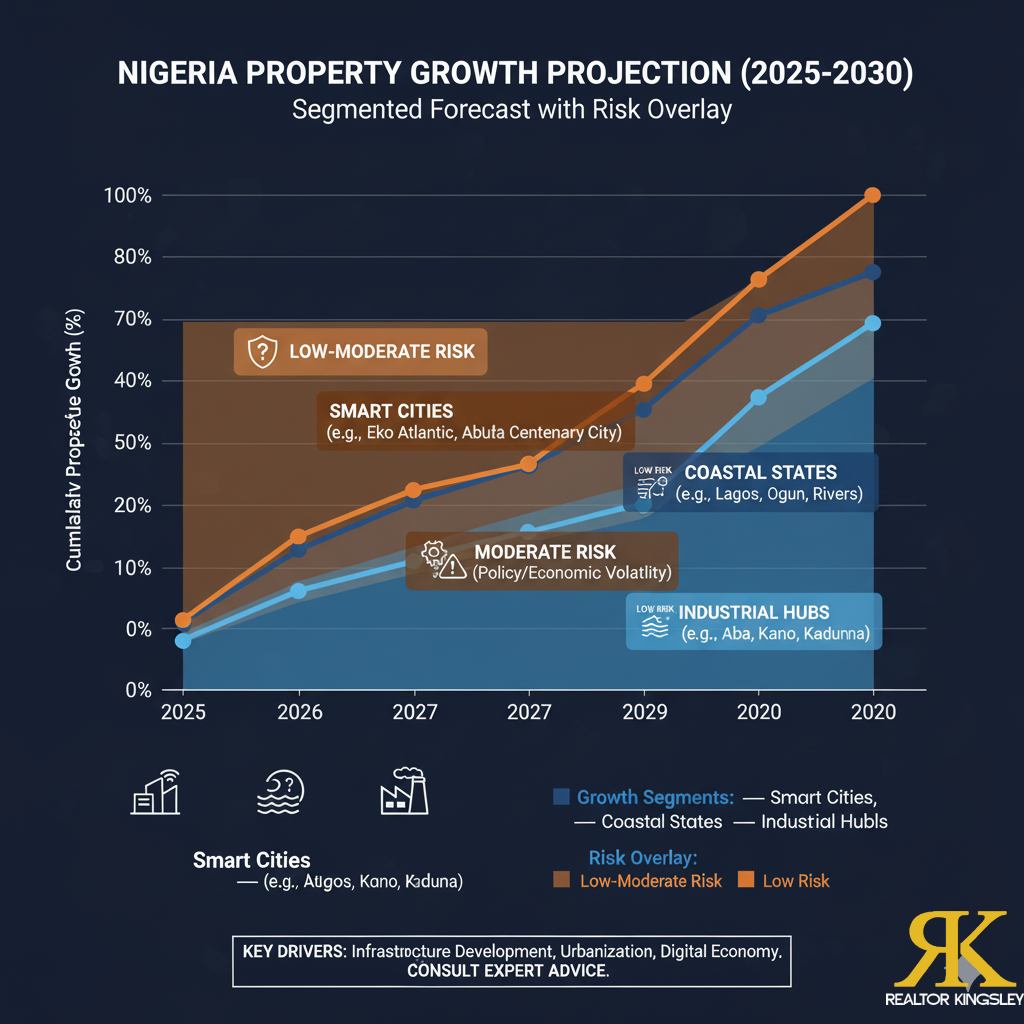
FAQs
Is real estate profitable in Nigeria in 2025?
Yes. Despite inflation and economic challenges, real estate remains one of the most stable and profitable investments in Nigeria. With urbanization, population growth, and infrastructure projects expanding across the country, land and housing values are projected to appreciate steadily between 2025 and 2030. Investors who buy early in emerging locations typically earn the highest returns.
Which Nigerian city has the fastest property appreciation?
Currently, Lagos (Ikoyi, Banana Island, Lekki) and Abuja (Maitama, Asokoro, Airport Road axis) lead in luxury and high-value property growth. However, satellite towns around Lagos-Ibadan Expressway, Ogun industrial hubs, and new corridors in Port Harcourt and Uyo are showing some of the fastest appreciation rates, especially for land banking.
How can I avoid omonile wahala?
To stay clear of land grabbers and fraudulent “family land” disputes:
- Always verify the C of O or land title with the state land registry.
- Work with trusted developers or registered estate companies.
- Use a real estate lawyer to cross-check documents before payment.
- Avoid paying cash to individuals—insist on bank transfers with receipts.
What’s the best strategy for first-time investors?
Start small with land banking in developing areas near new roads, bridges, or airports. These usually offer the highest ROI with low entry capital. First-timers should avoid risky joint ventures or unverified family lands. Partnering with credible developers or fractional ownership platforms is also a safer path.
Can diaspora Nigerians safely invest without being scammed?
Yes—if done the right way. Diaspora investors can:
- Buy through digitally verifiable REITs or fractional ownership schemes.
- Use developers with clear track records and registered offices.
- Employ lawyers or trusted family representatives to double-check transactions.
- Rely on proptech platforms offering blockchain verification and escrow services for added security.
Conclusion
Nigeria’s real estate market remains a high-risk but higher-opportunity frontier. From luxury districts in Lagos and Abuja to fast-rising industrial corridors and satellite towns, investors who move early and wisely stand to benefit from exponential property appreciation. Yet, challenges such as title fraud, economic volatility, and infrastructure delays mean due diligence and trusted partnerships are non-negotiable.
The future (2025–2030) promises smart cities, AI-driven property valuation, and PPP-driven housing schemes, all of which will reshape how Nigerians—and the diaspora—build wealth through real estate. Whether you’re a first-time buyer, a seasoned investor, or a diaspora Nigerian seeking safe entry, the opportunities are abundant if approached strategically.
Take the Next Step
- Subscribe to our newsletter for weekly market insights and updates.
- Download our Free Real Estate Investment Guide, to learn practical steps for securing profitable properties in Nigeria.
- Contact us today for personalized consultation and access to verified property offers in Abuja, Lagos, Ogun, and beyond.
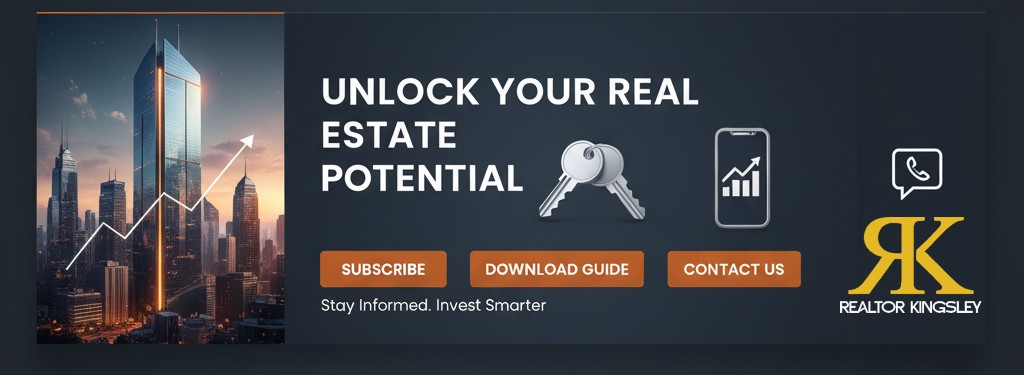


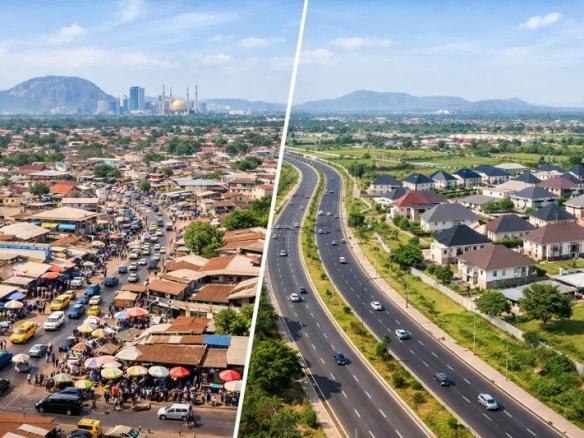

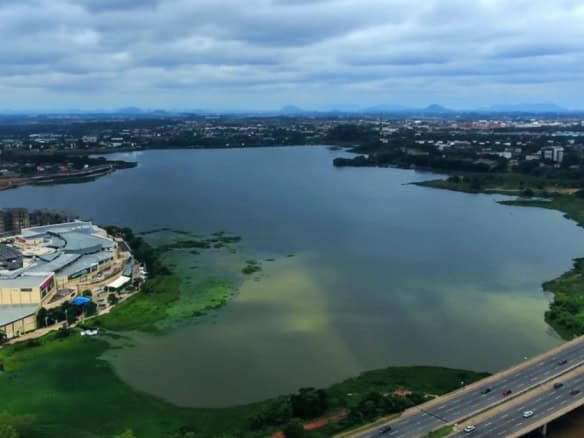
Join The Discussion